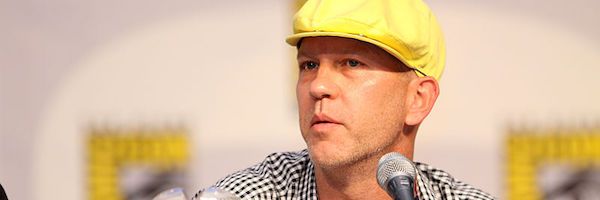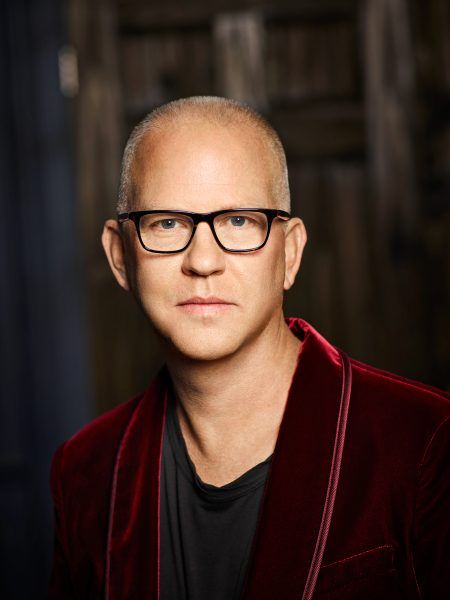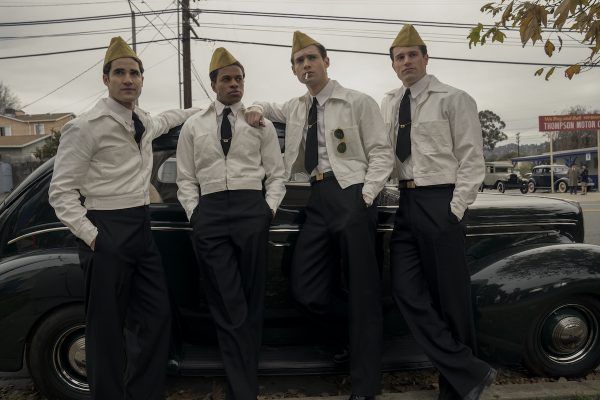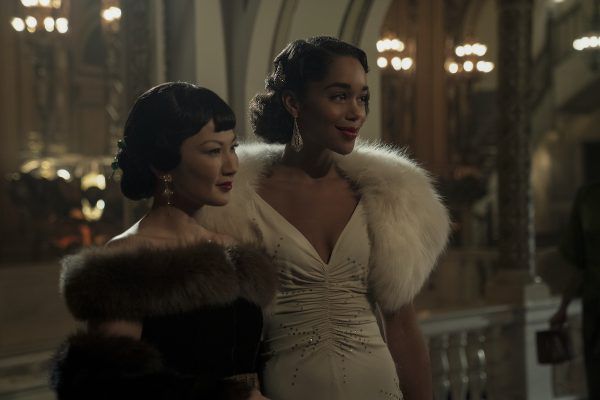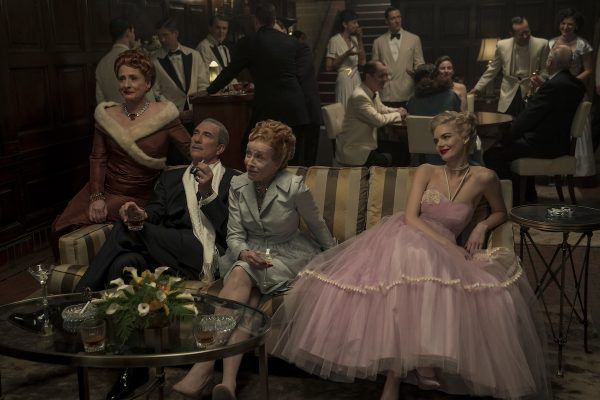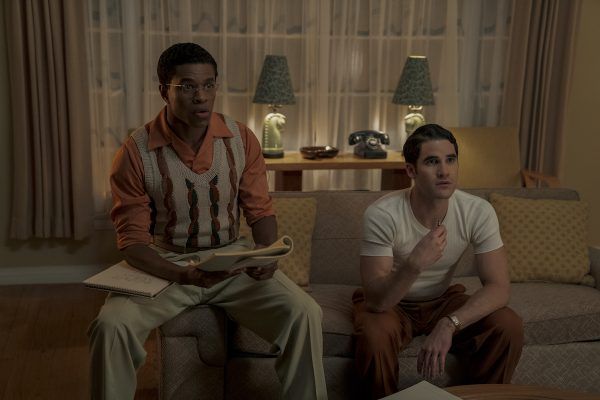What would have happened if inclusion and representation were taken more seriously in the Golden Age of Hollywood? While we will never actually know, Ryan Murphy and Ian Brennan attempt to answer the question in their Netflix limited series, Hollywood, which is like a What If…? comic book about Hollywood in the 1940s. The series takes real people like Rock Hudson, Anna May Wong, and Vivien Leigh and combines them with fictionalized aspiring actors and filmmakers who are willing to do whatever it takes to make Hollywood look at every person as equal, no matter their race or sexual orientation. Also, unlike some of Murphy’s previous projects like American Horror Story or American Crime Story, Hollywood has an upbeat and optimistic tone which works really well with the time period and material.
With the series arriving next week, I recently landed an extended interview with Murphy and he revealed why he wanted to tell this version of the Golden Age of Hollywood. He explained:
“I was not interested in making a biopic. I was not interested in doing a Wikipedia of Rock Hudson about, who did he know? How did he know them? Did he know Vivian Leigh? Was he aware of who Vivian Leigh was? Did he know who Tallulah Bankhead was? What I wanted to do is sort of an alternative universe look at it. In my universe, looking at these people, some things are the same and some things are very different. I want to make it clear to people that it is not a biopic approach to people’s lives. There are some things we kept very true, obviously, and there are some things that we changed.”
When I asked about where the idea came from, he revealed:
“It's just something I've been working on for years, but it started because I was sort of raised by my grandmother and she was very much an old movie buff. The Golden Era Age was her obsession because she was born in 1913. And so I grew up with her and she would expose me to a lot of movies, but more so she would expose me to a lot of books about movies.
When I was a kid, I was obsessed with three people and they were Rock Hudson and Anna May Wong and Hattie McDaniel. And I never really understood why I think until I was older. I think I just saw a lot of sadness in them. They weren't able to be who they wanted to be and express who they wanted to express. And they were really a sad part of Hollywood history and a cautionary tale.
I was always kind of thinking, even after Feud, 'Well, what can I do with these three people?' And I didn't really have the right... I didn't know. After Versace, I had a dinner with Darren Criss and we were talking about that Hollywood gas station and how interesting it was. And I was never interested in the sexuality of it really, or the sordidness of it. What I was interested in was the rather sad, upsetting idea that people had to go there to be who they were and to be able to express who they were.
Suddenly, I was like, 'Oh, this makes sense. I can put all of these interests, this buried history idea into one thing.' But as I told Darren... Darren and I had just finished doing Versace and I had pretty much finished the writing, I think, of Ratched, so I was interested in doing something upbeat and optimistic that sort of had a happy ending quality to it, which I've done not very often in my career.
Then everything just took off. Once I sort of figured out, okay, how do I put all of these things that I've been interested in in a while? But that's common for me. I was doing American Horror Story. It took me five years to figure out that first season, and I like it when things come to you slowly.”
While the entertainment business is attempting to do better about representation and diversity, everyone in town could learn from Ryan Murphy. If you’re not aware, Murphy created the Half Foundation, which works very hard to create equal opportunities for women and minorities behind the camera. In addition, Murphy created the Half Director Mentorship Program which pairs directors on every Murphy television production with "emerging women and minority directors through pre-production and post-production."
This is an incredible achievement and one of the reasons I’m such a fan of Murphy’s work.
When I spoke to him about what he’s done to champion minority voices and diversity, I was pretty effusive with my praise and asked him to talk about how it happened. He went on to say:
“Well, thank you for saying that. I mean, it's just from... what happened to me was everything in my life collided, literally, and that I had had enough success and enough really big hits. By the way, all of them, I was told, every single time I had a hit, I was told it would not be a hit. For example, nobody thought Glee would work except for a few of us. Nobody thought American Horror Story would work. Nobody thought The Normal Heart would work. Nobody thought OJ would work. I was used to, 'No, I believe in this.' And I had a lot of lovely people who controlled the purse strings in my life who said, 'Okay, well you've had enough successful, we'll bet on you.'
With that came, green light power and final edit power, but I realized that I had failed miserably. I remember, around this time of 2015, when I started directing, I remember that feeling of I was the only gay person in a set of 400 people, and it was my television show. Everybody was white, male and in their 50s. I just sort of decided, you know what, I'm going to change my own company and I'm just going to have very strict hiring rules.
I created something called the Half Foundation, where I demand that 50% of all of our shows are directed by women. I love championing people like Janet Mock, and helping her move through the system and helping her make her dreams come true. And asking her, she worked on Hollywood, 'What do you think?' And she had a lot to say, and she had a lot to say about how the writing should be changed, that we should do this with the Camille character, and think about this.
Once I got to a place where I was empowered, I've tried to empower other people. I think that more than even the things that I'm making is the legacy that I'm the most proud of. And I'm very, very aware of it because I look around town and I'm like, 'Where are the projects that are... ' We still don't have enough of them. We still don't have enough. We don't have enough Ava Duvernays and we don't have enough Steven Canals. We need to have more people like that, who are pushing their stories through the system. More Janet Mocks. Whenever I can step in and help, that's what I'm the most excited about now.”
Again, everyone in Hollywood should be looking at what Ryan Murphy has done and asking themselves how they can contribute.
Hollywood debuts on May 1st on Netflix and stars David Corenswet as Jack, Darren Criss as Raymond, Jeremy Pope as Archie, Laura Harrier as Camille, Samara Weaving as Claire, Dylan McDermott as Ernie, Holland Taylor as Ellen Kincaid, Patti LuPone as Avis, Jim Parsons as Henry Willson, Jake Picking as Rock Hudson, Joe Mantello as Dick, and Maude Apatow as Henrietta.
Look for our spoiler interview with Ryan Murphy in early May.
If you’d like to learn more about the Half Initiative, click here.

